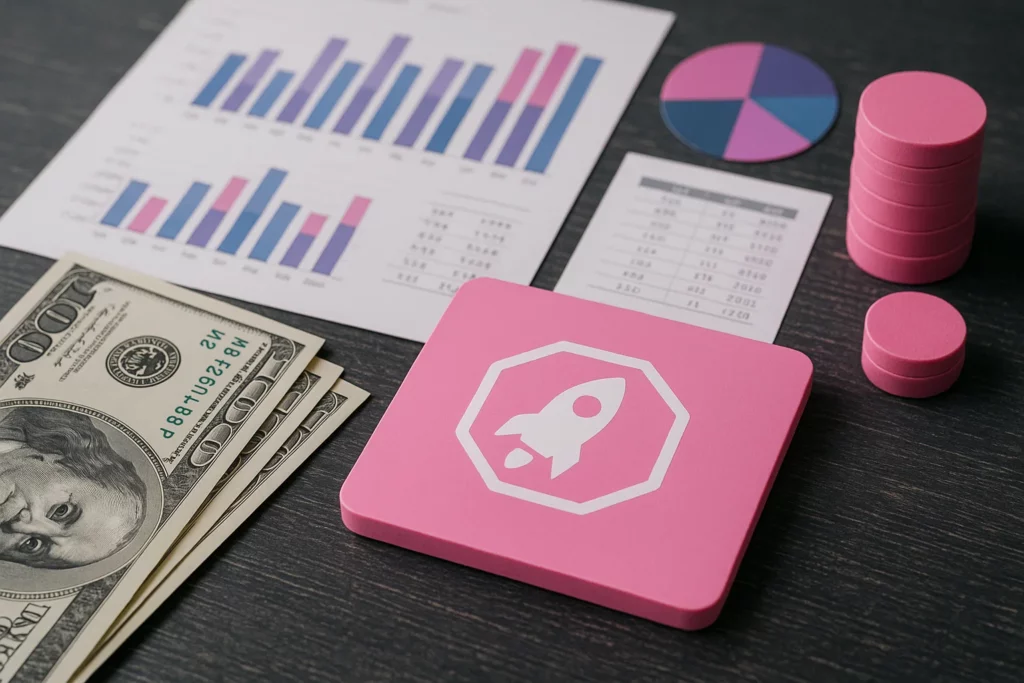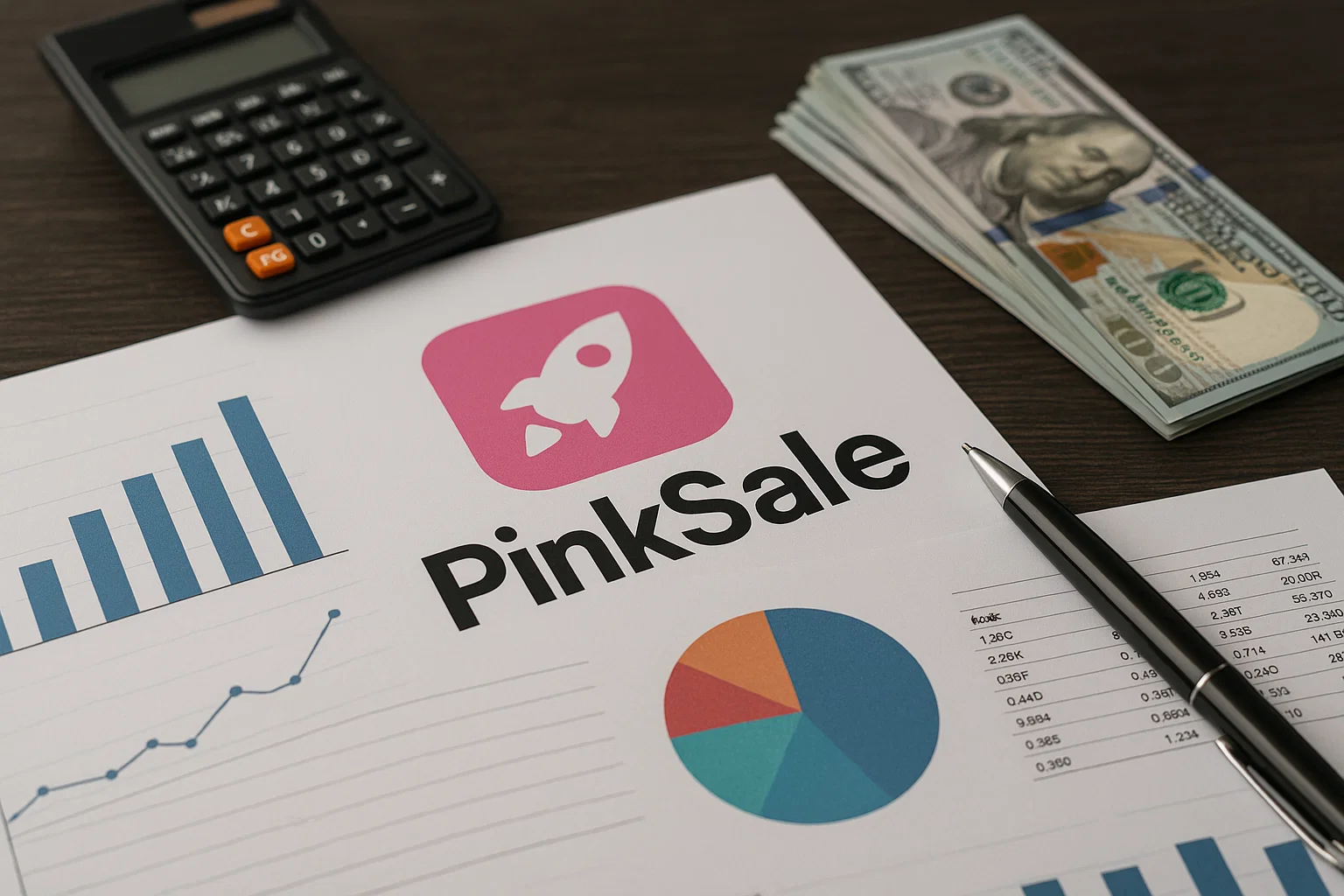In the ever-evolving world of crypto and decentralized finance (DeFi), PinkSale has carved out a dominant position as a go-to IDO (Initial DEX Offering) launchpad. By helping developers raise funds and launch tokens without the need for coding, PinkSale has democratized crypto project launches — and built a solid business model around it.
But how exactly does PinkSale earn money? And more importantly, can startup founders or SaaS entrepreneurs replicate this successful model?
In this blog, we’ll break down the revenue model of PinkSale, show how each income stream contributes to its financial success, and explain how Miracuves can help you build your own PinkSale-like launchpad with built-in monetization tools.
What is PinkSale and Why Its Revenue Model Matters
PinkSale is a decentralized launchpad platform that enables developers and crypto startups to create and launch their tokens across various blockchains like Binance Smart Chain (BSC), Ethereum, Polygon, and more — all without writing a single line of code.
Market Impact & Growth
- Over 20,000+ token launches and counting
- Supports 10+ blockchain networks
- Millions in liquidity raised via IDOs
- Integrated with PinkSwap and PinkLock for token listing and liquidity locking
PinkSale isn’t just a tool for token creators — it’s an entire DeFi ecosystem that earns revenue through multiple streams. That’s why studying its monetization strategy gives startup founders a blueprint to follow.

How PinkSale Makes Money ?
PinkSale has created a seamless ecosystem around token launch services — and each touchpoint is monetized. Here’s a quick overview of its major revenue streams:
- Platform Fees on Presales / Token Launches
- Token Listing Fees for launchpad visibility
- Liquidity Locking Fees through PinkLock
- DEX Listing Commissions via PinkSwap
- Premium & Featured Project Placement
- Affiliate Program Commissions
- Blockchain Network Integration Fees
Now let’s break each of these down to understand how they work, who pays, and why they scale.
Discover the complete PinkSale business model explained. Learn how its decentralized launchpad structure, key features, and revenue streams make it one of the leading players in DeFi fundraising.
Detailed Breakdown of Revenue Channels
1. Platform Fees on Token Launches
Every project that conducts a presale through PinkSale pays a flat fee or a percentage-based fee. This could range between 2% to 5% of the raised amount, depending on the chain and launch type.
- Who Pays: Token creators
- Why It Works: It’s directly tied to project success — the more funds raised, the more PinkSale earns.
- Scalability: This model scales with volume. As more projects launch, fees accumulate rapidly.
2. Token Listing Fees
Projects that want to be listed in PinkSale’s high-visibility zones (e.g., “Top Presales” or “Trending Projects”) pay a one-time or recurring listing fee.
- Who Pays: Token founders seeking exposure
- How It Works: Paid listings get boosted visibility on the platform homepage and presale listings
- Why It Scales: As competition rises, so does the demand for visibility — and revenue.
3. Liquidity Locking via PinkLock
To build trust with investors, token creators often lock liquidity using PinkLock — another revenue-generating product by PinkSale.
- How It Works: Projects pay a fee (fixed or % of locked amount) to lock their LP tokens
- Who Pays: Token projects
- Why It Scales: Locks are mandatory for credibility, especially in DeFi where rug-pull risks are high
4. Commissions from PinkSwap Listings
Once a token sale ends, many projects get listed on PinkSwap, PinkSale’s native DEX. The platform charges a listing fee and also earns from trading volume fees.
- Revenue Mode: % on every swap + fixed listing fee
- Who Pays: Indirectly paid by users through fees on each transaction
- Growth Factor: As more tokens list and are traded, the DEX revenue grows passively
5. Premium Project Promotion
PinkSale offers “Featured Project” slots, banner promotions, and homepage placements at a premium.
- Who Pays: Projects wanting more eyeballs and credibility
- Pricing: Can range from a few hundred to several thousand dollars depending on position and duration
- Why It Scales: The pay-to-play visibility model ensures recurring demand
6. Affiliate & Referral Commissions
Users can earn by referring new projects or users to PinkSale. The platform earns by sharing only a portion of the collected fees, keeping the rest.
- Who Pays: Indirectly from platform fee pools
- Why It Works: Encourages viral adoption and organic growth
7. Multi-Chain Integration Fees
PinkSale supports 10+ chains. Integration with each chain often involves listing fees, maintenance charges, and potential partnerships.
- Who Pays: Chains or token creators choosing cross-chain launches
- Monetization Opportunity: As more blockchains emerge, PinkSale gets paid to support them.
Why This Revenue Model Works in 2025
In 2025, the decentralized finance landscape continues to boom — and platforms like PinkSale are riding a wave of crypto adoption, regulatory evolution, and demand for permissionless fundraising tools. Here’s why PinkSale’s monetization model thrives in this environment:
1. Explosion of DeFi & Tokenization
The global DeFi market is expected to surpass $300 billion in TVL (Total Value Locked). Projects are launching tokens not just for fundraising, but for utility, governance, and community-building. This fuels constant demand for launchpads like PinkSale.
2. Automation & Code-Free Launches Are in Demand
Founders want to move fast. PinkSale’s no-code smart contract deployment removes technical friction, which attracts non-developers into DeFi.
3. Transparency & Trust-Building Services Like Liquidity Locks
Investors in 2025 are more cautious due to past rug pulls. Platforms offering trust tools like liquidity locking (PinkLock) or audits gain user preference.
4. Pay-to-Play Visibility Works
With 100s of new tokens launching every month, premium placement becomes a goldmine. Projects are willing to spend more to rise above the noise.
5. Multi-Chain Expansion = Revenue Multipliers
By supporting Ethereum, BSC, Polygon, Avalanche, and others, PinkSale opens doors to chain-specific partnerships, fees, and listings.
6. Community-Driven Affiliate Programs
Referral systems lower acquisition costs while creating viral growth loops. In 2025, affiliate-driven marketing remains one of the top-performing strategies in DeFi.
Master the Pinksale app marketing strategy to launch, hype, and fund your Web3 project, while exploring the best Pinksale clone scripts in 2025 with features and pricing compared.
Can Startups Replicate PinkSale’s Revenue Model?
Absolutely — but building a PinkSale-style platform from scratch isn’t a weekend project.
The Challenges of Building It Yourself
- Smart Contract Complexity: Writing secure, gas-optimized contracts for presales, token creation, locking, and swapping is a major hurdle.
- Multi-Chain Support: Supporting multiple networks like BSC, ETH, Arbitrum, and Polygon requires deep blockchain integration.
- Payment & Fee Logic: Designing flexible, automated fee collection (fixed + % based) is harder than it looks.
- UI/UX Expectations: In DeFi, poor design equals low trust. Projects need sleek, mobile-responsive dashboards.
- Security & Audits: To win user trust, you need external smart contract audits, which are time-consuming and expensive.
That’s why many founders turn to white-label or ready-made solutions — and that’s where Miracuves steps in.
Build Your Own PinkSale-Like Platform with Miracuves
At Miracuves, we provide a fully customizable PinkSale clone script that replicates its business model and monetization features — at a fraction of the time and cost.
✅ Built-in Revenue Streams
All major income sources — presale fees, liquidity locks, DEX commissions, featured listings — are pre-integrated.
✅ Multi-Chain Ready
Launch across BSC, ETH, and more from day one.
✅ Fast Time-to-Market
Skip months of dev work. Get your MVP live in 3-6 days, not quarters.
✅ Secure, Audited Codebase
DeFi is risky enough — your code shouldn’t be. Our smart contracts follow industry best practices.
✅ Custom Branding & Monetization Flexibility
Charge your own rates. Control your revenue logic. Add new chains anytime.
Learn how to build an app like PinkSale with our full-stack developer’s step-by-step guide and uncover detailed token platform development costs to budget effectively.
Conclusion
PinkSale has shown how powerful a multi-stream revenue model can be in the DeFi space. By charging fees on token launches, offering paid visibility, and building adjacent tools like PinkLock and PinkSwap, it has created an ecosystem where every feature fuels revenue.
The good news? You can replicate this model — without the headache of building it from scratch.
With Miracuves’ PinkSale Clone, you get:
- A ready-to-launch DeFi launchpad
- All key monetization features baked in
- Full customization and scalability
- Rapid deployment with secure smart contracts
So if you’re ready to enter the IDO space with a proven monetization strategy, don’t start from zero.
FAQs
How does PinkSale generate revenue?
PinkSale earns money through presale fees, liquidity locking services, DEX commissions, premium listings, and affiliate commissions.
Is PinkSale profitable in 2025?
While exact figures aren’t public, PinkSale’s consistent token launches, service fees, and DeFi integrations suggest it’s operating a highly profitable, scalable model in 2025.
What are the main income sources for PinkSale?
Its main revenue streams include platform fees on IDOs, PinkLock fees, token listing fees, PinkSwap commissions, and pay-to-promote features.
Can startups use the same revenue model as PinkSale?
Yes — with the right tools. Startups can launch similar platforms and monetize via fees, token tools, and featured listings, especially with clone solutions like the one from Miracuves.
Does Miracuves offer a PinkSale clone with monetization features?
Absolutely. Miracuves’ PinkSale clone includes built-in monetization like presale fees, liquidity locks, multi-chain support, and more — all customizable for your brand.








